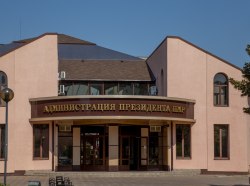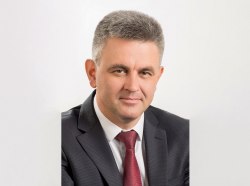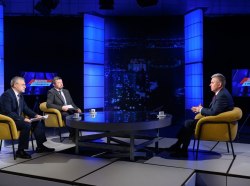Tiraspol, 11 May. /Novosti Pridnestrovya/. The Supreme Council has adopted today on first reading a draft law amending the law «On the mass media». The authors of the bill are Andrey Safonov, Igor Buga and Pavel Shinkaryuk.
The basic difference of the new draft is a norm that provides for the restriction of journalists' right to take photographs, make audio and video recording, and pursuant to which, the right of accredited journalists to attend various events is regulated by legal acts rather than laws of the PMR, as is the case now. In other words, there is a possibility of restricting journalists' activities, including with by-laws.
According to the head of the State Agency for the Mass Media, Inna Deleva, this forms a dangerous precedent when any journalist may be denied access to obtaining information with a ministerial decree.
At the same time, Igor Buga underscored that the bill aims at citizens realising their constitutional right to obtain comprehensive and timely information about the work of public authorities. The deputy also recalled that in case the draft law passes it ultimate reading, the state-run media will be subject to re-registration.
This is due to the fact that the present draft law changes the procedure of establishing state-run TV and radio stations financed from the republican budget. According to the proposed procedure, state-run media can be founded by the president, executive, legislative and judicial bodies.
The founder must notify the president, Supreme Council, government and the Council of Judges about his intention to establish a state-run media outlet requesting their agreement to consolidate their status as co-founders.
The registration of a media outlet is not possible without producing an agreement to consolidate the status of a co-founder or a refusal confirmed by corresponding documents. Currently, the law provides for the joint establishment of the medias well as the founding of media outlets by individual bodies of power.
According to the authors of the bill, their mechanism will exclude the existing monopoly of the state-run media, though it is already prohibited by the current law «On the mass media».
In the course of debate, the head of the agency refuted allegations made by some deputies that the president monopolised state-run media outlets, recalling that the Supreme Council is the founder of a state-run media People's Councils. Inna Deleva also cited the example of the Russian Federation with which Pridnestrovie aims to harmonise its legislation. The founder of the All-Russian TV and Radio Company (VGTRK) is a separate body of power — the government.
It should be noted that this bill has received a negative opinion of the president.
«This bill will deprive citizens of the possibility of obtaining timely information from state-run media outlets as according to the new procedure approved by the Supreme Council, they will receive materials only after applying corresponding requests. The authors' proposal to extend the application of these norms to legal relationships arisen since 2003 for the founders of state-run media outlets causes ambiguity. To the knowledge of the authors of the law, there is a principle in jurisprudence that a law shall not have retroactive force, i.e. it does not apply to the relationships arisen before it was passed. This rule ensures stable relations between legal subjects, confidence in stable legal relations, in permanent law and order. The founding of media outlets is covered by civil relations, which are based on equality, the autonomy of will and the independence of their subjects. Civil acts have no retroactive force and can only be applied to the relations arisen after they have come into force," reads the president's official opinion.
However, the draft law has been approved by a majority vote on first reading.








